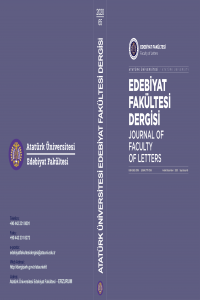Abstract
This article aims to examine the juxtaposition of individual stories and
collective history in J.G. Farrell’s Troubles to present a nuanced reading of
identity politics in Ireland during the Irish War of Independence. Farrell’s the
Lost Man Booker Prize recipient novel portrays one of the most tumultuous
periods of Irish history (1919-1922) focusing on the daily lives of characters
rather than the major political actors of the time. The novel, thus, prioritizes
the stories and tribulations of ordinary people in a highly polarized society that
incessantly urge individuals to define their alliances. This article contends that
the novel’s representation of the period emphasizes the historical trauma as
experienced by the characters rather than presenting a nostalgic glorification
of the British or the Irish.
Keywords
References
- Binns, Ronald. (1986) J. G. Farrell. London and New York: Methuen.
- Boccardi, Mariadele. (2009) The Contemporary British Historical Novel: Representation, Nation, Empire. New York: Palgrave Macmillan.
- Farrell, J.G. (2002) Troubles. New York: New York Review of the Books.
- Goodman, Sam. (2015) “Mongrel Nation: Animality and Empire in the Novels of J.G. Farrell”. European Review of History, No: 22:5, p. 757-770.
- Lea, Daniel. (1999) “Troubles and J.G. Farrell’s Interiority Complex”. Etudes Irlandaises, No: 24:1, p. 79-89.
- Lukacs, Georg. (1989) The Historical Novel. Hannah and Stanley Mitchell (Trans.) London: Merlin Press. (Originally published in 1937)
- Morrison, Steve. (2015) “Houses of Decay: Joyce, History and J.G. Farrell’s Troubles”. M.C. Carpentier (Ed.). Joycean Legacies. (p. 54-70). London: Palgrave Macmillan.
Abstract
This article aims to examine the juxtaposition of individual stories and
collective history in J.G. Farrell’s Troubles to present a nuanced reading of
identity politics in Ireland during the Irish War of Independence. Farrell’s the
Lost Man Booker Prize recipient novel portrays one of the most tumultuous
periods of Irish history (1919-1922) focusing on the daily lives of characters
rather than the major political actors of the time. The novel, thus, prioritizes
the stories and tribulations of ordinary people in a highly polarized society that
incessantly urge individuals to define their alliances. This article contends that
the novel’s representation of the period emphasizes the historical trauma as
experienced by the characters rather than presenting a nostalgic glorification
of the British or the Irish.
Keywords
References
- Binns, Ronald. (1986) J. G. Farrell. London and New York: Methuen.
- Boccardi, Mariadele. (2009) The Contemporary British Historical Novel: Representation, Nation, Empire. New York: Palgrave Macmillan.
- Farrell, J.G. (2002) Troubles. New York: New York Review of the Books.
- Goodman, Sam. (2015) “Mongrel Nation: Animality and Empire in the Novels of J.G. Farrell”. European Review of History, No: 22:5, p. 757-770.
- Lea, Daniel. (1999) “Troubles and J.G. Farrell’s Interiority Complex”. Etudes Irlandaises, No: 24:1, p. 79-89.
- Lukacs, Georg. (1989) The Historical Novel. Hannah and Stanley Mitchell (Trans.) London: Merlin Press. (Originally published in 1937)
- Morrison, Steve. (2015) “Houses of Decay: Joyce, History and J.G. Farrell’s Troubles”. M.C. Carpentier (Ed.). Joycean Legacies. (p. 54-70). London: Palgrave Macmillan.
Details
| Primary Language | English |
|---|---|
| Subjects | Creative Arts and Writing |
| Journal Section | Articles |
| Authors | |
| Publication Date | December 18, 2020 |
| Submission Date | August 31, 2020 |
| Published in Issue | Year 2020 Issue: 65 |

